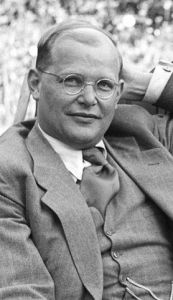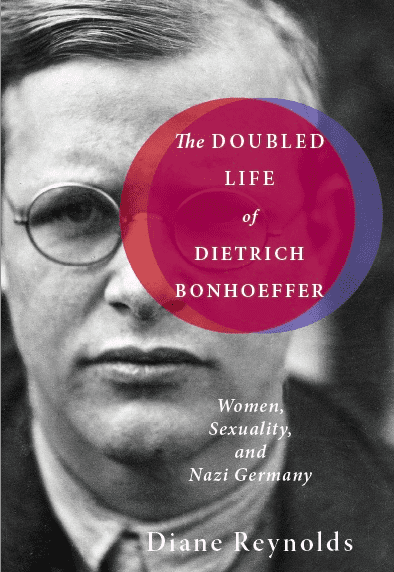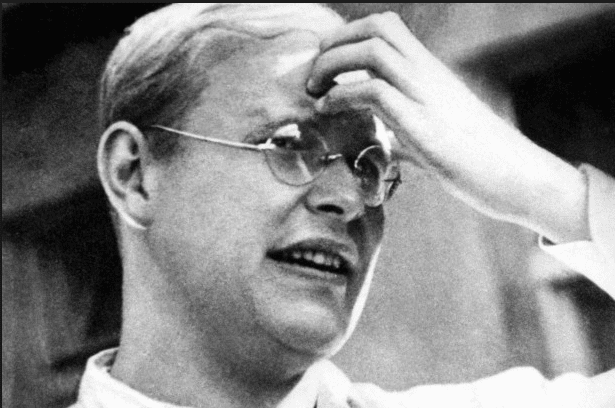 A standard reading of Bonhoeffer, one I have believed most of my academic life, is that Bonhoeffer shifted from a kind of traditional socially conservative, fairly nationalistic approach to church-state relations to a pacifist-Sermon-on-the-Mount stance but that, once he returned to Hitler’s Germany after a brief spell at Union Theological Seminary, he shifted to a kind of (Niebuhrian) realism and abandoned his former pacifist stance.
A standard reading of Bonhoeffer, one I have believed most of my academic life, is that Bonhoeffer shifted from a kind of traditional socially conservative, fairly nationalistic approach to church-state relations to a pacifist-Sermon-on-the-Mount stance but that, once he returned to Hitler’s Germany after a brief spell at Union Theological Seminary, he shifted to a kind of (Niebuhrian) realism and abandoned his former pacifist stance.
But a new book is out, by Mark Thiessen Nation, Anthony G. Siegrist, and Daniel P. Umbel, called Bonhoeffer the Assassin? Challenging the Myth, Recovering His Call to Peacemaking (BakerAcademic, 2013), and this book challenges front to center this standard reading of Bonhoeffer. There’s already a bit of a dustup about the proposals in that Roger Olson thinks Nation et al have overcooked their theory, and already Mark Nation has responded back (on Roger Olson’s blog’s comments).
I want to summarize their theories in brief compass and not drag this post on and on.
1. There is no evidence from Bonhoeffer himself — in writing — that he was involved in any conspiracy to kill Hitler. Yes, his brother in law and friends were conspirators, but there’s nothing from Bonhoeffer’s own hand that proves it.
2. Yes, Bonhoeffer was involved in the Third Reich’s Abwehr, their military intelligence agency, and this could have had as its purpose participation in the conspiracy against Hitler, since a fraction there were conspirators, but the evidence we have suggests Bonhoeffer’s involvement in the Abwehr was prompted in order to prevent him from having to serve in the military on the front lines and in the killing in the name of Hitler. The evidence further suggests he used his Abwehr work to further his ecumenical work and to pass on insider information about the atrocities of Hitler to outsiders and foreigners.
3. The evidence that Bonhoeffer was involved in the conspiracy comes exclusively from his biographer, Eberhard Bethge (Dietrich Bonhoeffer: A Biography), by far the best biography and done by one who personally worked with and knew well Bonhoeffer himself. Bethge says Bonhoeffer was a conspirator and that his conspiracy work involved him in “boundary work” — that is in doing things that were on the border of his ethical beliefs. The evidence, then, is based on Bethge’s memory. Roger Olson presses this point hard to argue that he trusts Bethge.
4. But Nation et al are arguing their case on a profoundly informed basis: they have mapped carefully the development of Bonhoeffer’s theological ethics from his early period (Barcelona in the late 1920s), the most influential Discipleship book in the late 30s when he was leading the underground seminary, and then in the later Ethics where we encounter his “worldliness.” What this book does in the middle chapters, chapters harder to read than the others, is to demonstrate that there is a decisive break between Barcelona and Discipleship, one in which Bonhoeffer shifts from anti-pacifism to pacifism on the basis of the Sermon on the Mount and Jesus’ teachings. What the book also demonstrates is that there is no such break or significant shift between Discipleship and Ethics, but that once one understands the role both Sanctorum Communio and Act and Being (his dissertation and habilitation) plays in his development, one sees much more continuity — a Jesus based and christologically shaped ethic — than discontinuity. To argue that Bonhoeffer changed his mind requires that he significantly changed his mind and abandoned his Discipleship themes. Bonhoeffer himself denies this and affirms that he stands by his Discipleship. Without that evidence of shift between Discipleship and Ethics, the argument about Bonhoeffer shifting just doesn’t gain traction.
Put differently, the issue can’t be reduced to Bethge’s words but the pro-conspiracy folks must also show that there is evidence for a clear diminishment of the ethical theories at work Discipleship in the later Ethics. So, to argue Bethge got it right one must prove that Bonhoeffer changed his mind on how to do Christian ethics. Bonhoeffer himself says he stood by Discipleship late in his life.
Put yet one more way: the memory of Bethge is being challenged by the concrete evidence of the texts themselves. This is methodologically reasonable.
My own response:
1. I no longer place Bethge’s words at the level I would have placed them; I don’t know what to think of Bethge’s claims. Nation et al have, so I think, made a good case for testing Bethge’s statements over against the documentary evidence and, more importantly, the themes and their development in Bonhoeffer’s ethics.
2. The case for seeing continuity at a deep structural level — christology, incarnation, new context — between Discipleship and Ethics is very hard to disprove. I think Nation et al have done their work here; for me to counter this would mean some very careful reading of Ethics and a comparison with Discipleship. I do not know Ethics well enough to do this nor will my schedule likely permit such work right now. (Though I’d love to do that.) All in all, then, I don’t think there’s sufficient evidence to see a crisis of change in Bonhoeffer’s thinking for us to accept the fairly standard realist shift in Bonhoeffer’s WW2 thinking.
3. In summary, I consider this book a successful challenge to the ruling paradigm that sees a major shift in Bonhoeffer from his idealism of Discipleship to a realist posture in Ethics. In other words, if you remember my first post on this (28 Oct), I’m glad I removed that section. I no longer think Bonhoeffer made a tragic mistake in entering into the conspiracy and so shifted from his pacifism because I’m not convinced he entered into the conspiracy. Bonhoeffer may well have sustained his pacifism.













